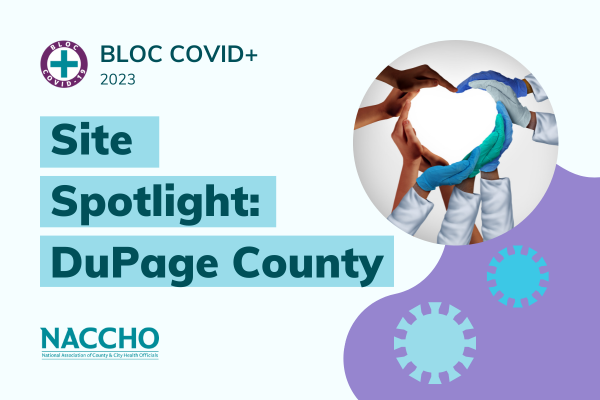The Building Local Operational Capacity for COVID-19, Healthcare-Associated Infections, and Antimicrobial Resistance (BLOC COVID-19+) project continues and expands upon the first year of the BLOC COVID-19 Demonstration Site project by allowing LHDs to go beyond COVID-19 response and address other HAIs and AR pathogens.
The goals of the BLOC COVID-19 + project are to:
- Strengthen relationships between LHDs and facilities and partners;
- Enhance LHD capacity and confidence in assessing and supporting infection prevention and control (IPC) practices in high-risk facilities;
- Improve implementation of IPC in high-risk facilities; and
- Decrease rates of and negative outcomes associated with COVID-19, HAIs, and AR pathogens in those facilities.
We asked our BLOC COVID+ sites to reflect on their experiences and lessons learned since joining our project. Here is what one of our sites, DuPage County, shared with us. A standalone version of their blog post can be found here.
Building Trust by Strengthening Relationships
“DuPage County Health Department (DCHD), in Wheaton, IL, has partnered with the National Association of County and City Health Officials (NACCHO) since 2011 to address infection prevention and control (IPC) needs, particularly those in long-term care facilities (LTCFs). DCHD’s Communicable Disease and Epidemiology Unit (CDE) has supported IPC efforts through conducting a baseline needs assessment with nearly a dozen LTCFs in DuPage County, with subsequent multiple IPC and antimicrobial stewardship campaigns. CDE has also provided educational IPC resources and guidance virtually and in-person to over 100 local LTCFs. Since 2022, CDE has led several infection control assessment and response (ICAR) visits to healthcare facilities. Building trust with LTCF colleagues is critical when partnering to identify gaps and implement new processes and procedures based on the latest guidance. Local health departments (LHDs) can develop trust with LTCFs by being accessible and helpful.”
Be Accessible
“LHDs can be accessible to LTCFs by 1) confirming LTCFs have correct contact information for LHDs, including for urgent issues that must be addressed after hours; 2) providing access in multiple modalities, e.g., one-on-one consultation, conference call, tele-ICAR, or in-person visit; and 3) being persistent in LHD outreach to LTCFs. With the amount of staff turnover at LTCFs, periodically touching base with facilities to confirm they know how and who to contact at the LHD is key to assuring cases and outbreaks are addressed quickly and appropriately. LTCFs may also have differences in staff availability and technological capacity, so providing different modalities for communication ensures facilities are able to successfully connect with the LHD. Finally, given ongoing staffing challenges exacerbated by the COVID-19 pandemic, it may be necessary for LHDs to make multiple contact attempts to multiple LTCF colleagues (e.g., Infection Prevention designee, Director of Nursing, Administrator) before successfully connecting with the best point-of-contact.”
Be Helpful
“LHDs can be helpful to LTCFs by 1) responding to questions and situations raised by LTCFs; 2) sharing resources that address gaps in IPC knowledge; and 3) reminding LTCFs of the role of the LHD. LTCFs need LHDs to share resources and strategies to help them directly address issues they’re encountering in their facilities. Given staff-to-resident ratios and a growing number of responsibilities, LTCFs benefit from concise guidance that is directly applicable to their settings.
Additionally, different LTCFs have different IPC capacity: some have designated infection preventionists (IPs) who are certified experts in their field, while other LTCFs have IPC designees who are only recently becoming familiar with IPC responsibilities and are performing other LTCF roles (e.g., Assistant Director of Nursing). LHDs must meet LTCFs where they’re at in IPC knowledge and share resources and guidance tailored to their needs. For example, CDE and additional DCHD colleagues created and maintain a website with current resources to support LTCF-specific healthcare-associated infection (HAI) prevention activities.
Finally, in Illinois, LHDs are not the regulatory authority for LTCFs, but serve in an educational and case/outbreak investigation role. This distinction allows LHDs to serve in a supportive role without inducing concern from the facility over penalties. One successful tactic CDE has used to obtain buy-in for ICARs is to use it as a no-pressure opportunity for a LTCF to identify and address IPC gaps prior to incurring any fines or identified violations during a formal survey.
Many LHDs already employ these techniques in their interactions with LTCFs, so this entry should serve to remind and reinforce the excellent work already being completed by LHDs and LTCFs. The closer these two groups can collaborate, the better life can be at the LTCF, with a safer environment for residents, staff, and visitors.”



